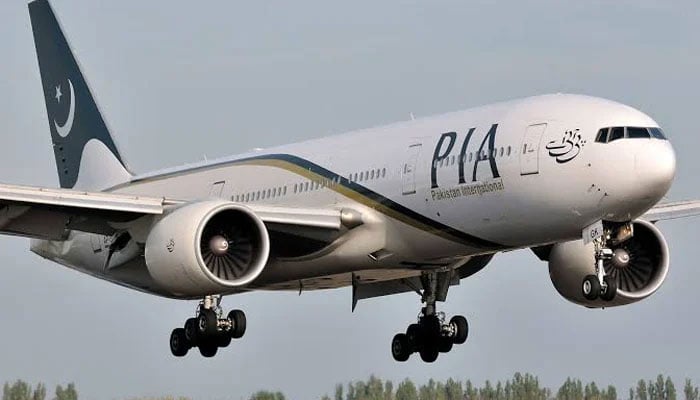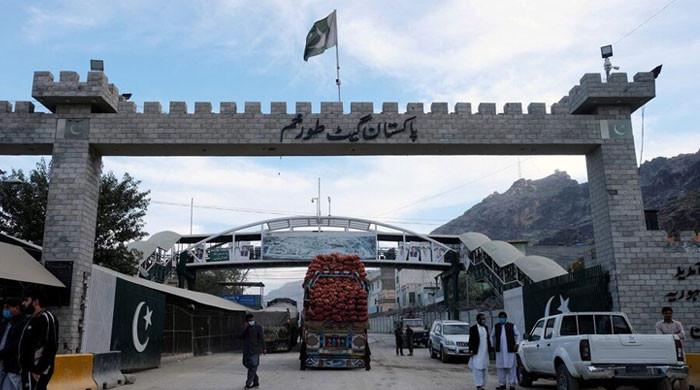Govt privatises loss-making PIA ahead of polls
National flag carrier would be divided into two companies — TopCo and HoldCo
February 07, 2024

- Privatisation would be difficult for upcoming govt.
- PIA to be divided into two companies — TopCo, HoldCo.
- Decision taken in meeting under PM Kakar's chairmanship.
ISLAMABAD: The federal cabinet approved the restructuring of Pakistan International Airlines (PIA) just two days before the 2024 general elections which would be difficult for the upcoming elected government, The News reported Wednesday.
In light of the financial adviser hired for financial restructuring, the national flag carrier would be divided into two companies — TopCo and HoldCo.
The crucial decision was taken during a meeting under Caretaker Prime Minister Anwaar-ul-Haq Kakar's chairmanship on Tuesday.
Some basic operations, including engineering, ground handling, flight kitchen and training, would be assigned to TopCo while Precision Engineering Complex, PIA Investment Limited and subordinate departments and properties would be given to HoldCo.
Caretaker Minister for Privatisation Fawad Hasan Fawad, who moved the summary, informed the cabinet that such a step would result in attracting investors towards PIA.
The meeting also directed settling disputes about dues to government organisations against PIA to complete the restructuring process in the shortest possible time.
Then-Pakistan Democratic Movement (PDM)-led government said in August last year that it would privatise the airline as part of a fiscal discipline plan agreed under an International Monetary Fund (IMF) bailout.
The airline has long been in crisis and then-railway and aviation minister Khawaja Saad Rafique warned that the airline may endure alarming losses of Rs259 billion by the year 2030 if urgent corrective measures are not implemented, including transfer of its administrative control to the private sector.
PIA flights to Europe and the UK have been suspended since 2020 after the European Union's Aviation Safety Agency revoked the national carrier's authorisation to fly to the bloc following a scandal over pilot licences.
Other cabinet decisions
Other than that, the federal cabinet recommendation of the ministry also okayed the privatisation of the First Woman Bank.
The federal cabinet at its meeting also decided to stop wheat imports at the government level given its huge reserves in the country. The cabinet meeting endorsed the decision of the Economic Coordination Committee (ECC) of the cabinet taken on February 1 regarding the ban on the import of wheat, which would also result in saving foreign exchange.
The cabinet meeting noted that along with sufficient reserves of wheat, there was also stability in flour prices. It may be pointed out here that recently, the Trading Corporation of Pakistan issued tenders for the import of 110,000 metric tonnes of wheat.
According to estimates, the country would also have a bumper wheat crop for the current season as production of wheat would exceed 32.1 million tons, which is 1.8% more than the target.
A total of 1.376 million tonnes of wheat worth Rs113.13 billion have been imported during the first six months of the current fiscal year.
On the recommendation of the Ministry of National Health Services, the cabinet also approved the deregulation of prices of medicines except essential medicines which do not exist on the national list. It was decided to exempt medicines from the Drug Act 1976 by making necessary amendments in the Drug Policy 2018.
It also decided that the Pakistan Medical and Dental Council would ensure that doctors must not prescribe vitamins, multivitamins, minerals and other such drugs to patients. The Drug Regulatory Authority of Pakistan (DRAP) would prepare a list of vitamins, multivitamins, minerals, etc., and would be in contact with provincial governments.
It also allowed the conversion of four out of eight accountability courts in Peshawar into special courts. Apart from this, the proposal of the chief justice Peshawar High Court has been approved for the appointment of judges in these courts. The remaining courts will continue to function as accountability courts. These changes will not put any additional burden on the national exchequer.
The meeting on the recommendation of the Ministry of Defence Production also approved the appointment of Lt. General Tahir Hameed Shah as chairman and member of the Wah Ordinance Factories Board with effect from November 29, 2023.
PPMA, Pharma Bureau welcome decision
The Pakistan Pharmaceutical Manufacturers Association (PPMA) and Pharma Bureau have welcomed the federal cabinet’s decision to approve 146 hardship cases pending for over 2 years and to deregulate the prices of medicines outside the essential medicines list based on the World Health Organisation (WHO) model list.
In a statement, PPMA and Pharma Bureau said this important step, which follows international best practices and successful pharmaceutical global models, will ensure the availability of quality medicines at competitive rates and build the foundations of an export-focused pharmaceutical sector.
Most importantly, it will ease the sufferings of patients who have faced extreme difficulty in recent months due to non-availability of life-saving medicines, the statement added.
There are 464 medicines in the National Essential Medicines List that will remain under price regulation as compared to 232 in India, 117 in Bangladesh and only 60 in Sri Lanka.












